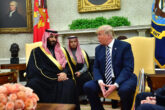February 28, 2019
The EU Needs a Better Way to Screen Chinese Investment. It Should Look to France.
From the United States to Australia, countries are tightening restrictions on investment in strategic sectors like energy and defense, with a wary eye toward China. There are mounting concerns globally about the pitfalls associated with Chinese investment and whether it is a Trojan horse for Beijing to gain access to critical technologies, data and infrastructure that it can use for its own military ends. Europe is not immune to these concerns, and late last year, the European Union passed an investment screening mechanism of its own that specifically targeted China. Yet the EU will still have to do more to tackle forced technology transfers, both lawful and illicit, and other issues. Fortunately, it can look to one of its own members for a scalable solution: France, which has adopted a smart approach to foreign investment, adding scrutiny while staying open for business.
Chinese investments across Europe are substantial, totaling $33.7 billion in 2017. Of China’s top 20 foreign investment destinations in 2017, five were EU countries. While this investment has helped to offset other economic woes on the continent, it has come with legitimate concerns. Even though the EU collectively represents the world’s largest economy, it has received little reciprocity from Beijing. EU companies entering the Chinese market are often forced to share their intellectual property and are restricted to investments in limited sectors, while Chinese companies enter the European market with no similar restrictions.
Read the full article in World Politics Review.
More from CNAS
-
Game Over?
The trade wargame suggests that sustained high tariffs could create leverage and urgency to spur action toward a productive restructuring of the international trade system....
By Emily Kilcrease & Geoffrey Gertz
-
Middle East Security / Energy, Economics & Security
Trump Inks $600 Bn Deal In Saudi Arabia | Musk, Blackrock CEO Flank Trump In Gulf VisitIn today's episode of India Global, U.S. President Donald Trump secured a $600 billion commitment from Saudi Arabia on Tuesday to invest in the United States. NDTV's Gaurie Dw...
By Daniel Silverberg
-
Energy, Economics & Security / Technology & National Security
Tariffs and Tech: An Uncertain RecipeHigher tariffs could prompt American cloud companies to shift more of their capital investments abroad....
By Pablo Chavez
-
Trump Tariffs: How Will U.S. Plans Reshape the Global Economy?
Donald Trump says he's already decided the tariffs he will impose on countries that export goods to America, including the United Kingdom. Channel 4 hears from Emily Kilcrease...
By Emily Kilcrease




